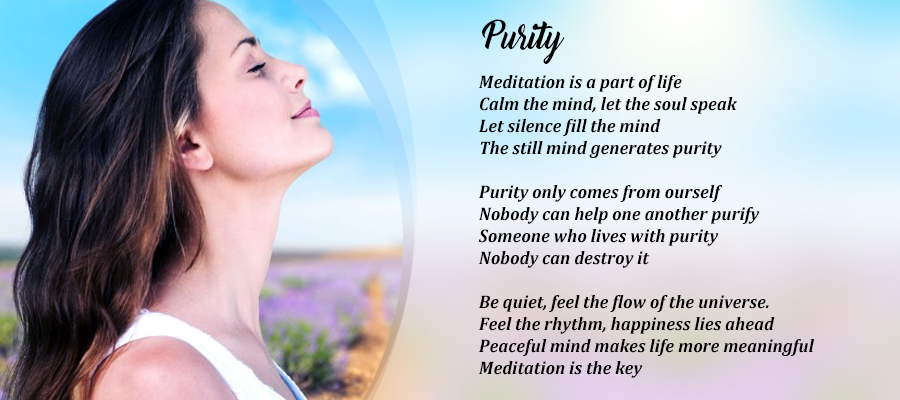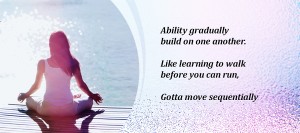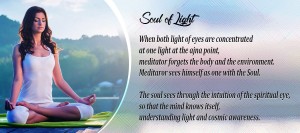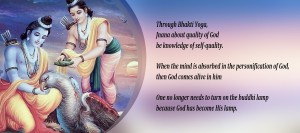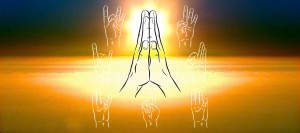Meditation is a movement into the whole of how we live, how we behave, whether we have fears, anxieties, sorrows; whether we are everlastingly pursuing pleasure; and whether we have built images about ourselves and about others. That is all part of our life, and in the understanding of that life and the various issues involved in life, and actually being free from them, we inquire into meditation.
Our house is our self. That order is established, not according to a pattern, but when there is a complete understanding of what disorder is, what confusion is, why we are in contradiction in ourselves, why there is this constant struggle between the opposites, and so on. The very placing of things in their proper place is the beginning of meditation. If we have not done that actually, not theoretically, in daily life, every movement of our lives then meditation becomes another form of illusion, another form of prayer, another form of wanting something.
Silence to purify the mind
We must understand the importance of the senses. Most of us react or act according to the urges, demands, the insistence of our senses. Those senses never act as a whole; all our senses never function, operate, as a whole, holistically.
If you observe yourself and watch your senses you will see that one or the other of the senses becomes dominant, one or the other of the senses takes a greater part in our daily living. So there is always an imbalance in our senses.
Is it possible to live without the action of will?
Most of us live a life of restraint, control, suppression, escape, but when you say, “I must control myself, my anger, my jealousy, my laziness, my indolence,” who is the controller? Is the controller different from that which he controls? Or are they both the same? The controller is controlled.
The controller is the essence of desire, and he is trying to control his activities, his thoughts, his wishes. Realizing all that, can one live a life that is not promiscuous, that is not just doing what one likes.
How can the mind know if it has found what it calls the ultimate, the immeasurable, the nameless, the most sublime?
As it cannot possibly know that which is limitless, unknowable, that which cannot possibly be experienced, all the mind can do is to free itself from all categories of pain, anxiety, fear, and the desire that ultimately creates an illusion.
The “me” with all its images is the center which divides all relationship and therefore brings about conflict. If the mind has not brought about right relationship with another, mere inquiry into or seeking reality has no meaning whatsoever, because life is a relationship.
Life is action in a relationship, and if that is not deeply, fully understood and established, you cannot go very far. Without that, merely to seek becomes a form of escape from the reality of the relationship.
Until the mind is deeply established in behavior that is righteous, order that is virtue, search or inquiry into what is real has no meaning, because a mind that is not free from conflict can only escape into what it considers to be real.
How can the mind which is so conditioned, which is shaped by the environment, by the culture in which we are born to find that which is not conditioned? How can a mind that is always in conflict within itself find that which has never been in conflict?
So in inquiring, the search has no meaning. What has meaning and significance is whether the mind can be free, free from fear, free from all its petty little egotistic struggles, free from violence, and so on. Can the mind—your mind—be free of that? That is the real inquiry.
And when the mind is really free, then only is it capable without any delusion of asking if there is, or if there is not, something that is absolutely true, that is timeless, immeasurable.
You have to be a light to yourself, you cannot possibly take the light of another, or be illumined by another.
You have to find out for yourself this whole movement of life with all its ugliness and beauty and the pleasures and the misery and the confusion and step out of that stream.
And if you have, and I hope you have, then what is religion? All organized religions are a matter of thought building a structure, a legend around a person or an idea or a conclusion. That is not a religion at all. Religion is a life that is lived integrally, wholly, not fragmented.
Most minds are broken up, fragmented, and what is fragmented is corrupt. So what is the mind, the brain, that can function in the world in the field of knowledge, and also live in freedom from the known? These two must go together in harmony.
It is obvious that to see anything very, very clearly the mind must be quiet. If I want to listen to what is being said, I must give attention to it, and that attention has the quality of silence.
To find out not only the meaning of words but beyond, I must listen very, very carefully. In that listening I am not interpreting what you are saying, I am not judging, I am not evaluating, I am actually listening to the word and what lies behind the word, knowing that the word is not the thing, that the description is not the described. So I am listening to you with total attention.
In that attention, there is no “I” as a listener, “I” who separates himself from he who speaks, who divides “me” and “he”
So the mind that is capable of listening completely to what is being said and going behind the word, must give total attention. You do that when you are looking at a tree with total attention, or when you are listening to music, or when you are listening to somebody who is telling you something most urgent, serious.
That state of attention in which the “I” is totally absent is meditation.
Because in that state there is no direction, there are no frontiers which thought has built around attention.
Attention implies a mind that has no desire to acquire, attain, arrive, or be something. Otherwise, conflict comes into being. So attention is the total absence of any conflict, a state of mind in which direction, will, has no place whatsoever. And that takes place when I am listening to you, when I am listening to the sound of a bird, or when I am looking at the marvelous mountains. So in that state of attention, there is no division as the observer and the observed. When there is that division, then there is conflict.
If a mind is really serious in its inquiry, this meditation is necessary because then the way we live, which has lost all its meaning, becomes meaningful.
Life becomes a movement, a harmony between the known and the unknown.
Meditation is a daily life in which there is no control whatsoever. Our life is wasted in the enormous energy that is dissipated in controlling.
We spend our days in control, and we do not know how to live a life completely free of control. It demands a tremendous inquiry, great seriousness to find out a way of living in which there is not a shadow of control.
Why do we control at all, and when we control, who is the controller? And what is he controlling, that is, withholding, directing, shaping, conforming, imitating? One observes in oneself the contradictory desires: wanting and not wanting, doing this and not doing that, the oppositions of duality.
Silence will give more space to the mind
There are you looking at the thing, so there is a division between you and the thing you observe. You observe a tree, and the observer, the past, says, “That’s an oak tree.” When it says, “That is an oak tree,” that knowledge is the past and that past is the observer.
You work it out to understand this movement of division as the observer and the observed that creates conflict and therefore has no direct relationship with another.
In meditation, life is a total movement, not fragmented, not broken up as the “me” and the “you.”
You have not only to understand this whole movement of daily living, which is part of meditation, and in that have no control whatsoever so that there is no conflict, no direction, but you also have to have a life that is immensely energetic, active, real, creative.
In meditation, the mind becomes completely quiet, silent. You know, silence has space and the mind has no space. It is too crowded with the knowledge that we have acquired and it is eternally occupied with itself what it must do, what it must not do, what it must achieve, what it must gain, what others are thinking about it. It is full of the knowledge of other people, conclusions and ideas and opinions. So we have very little space in our minds. And one of the factors of violence is the lack of space. In ourselves, we have very little space, and one must have space.
It is part of meditation to come upon the space not invented by thought because when you have space the mind can function totally. A brain that is completely in order absolute order, not relative order has no conflict and therefore it can move in space.
Silence is really an extreme form of the highest order. So silence is not something you contrive, that you try to practice, or try to become aware of. The moment you are aware that you are silent, it is not silence. Silence is the highest mathematical order, and in that silence, the other parts of the brain that have not been occupied, that have not been active, become totally active. The brain, not being in conflict, has great space, not created by thought as space but an actual sense of space and that space has no border. Thought has no place in this whatsoever. As we are describing this, we are employing thought, using the words that thought uses to communicate, but the description is not the described. So the mind with its brain becomes totally silent and therefore of the greatest order. Where there is order there is vast space.
And what lies in this vast space nobody can tell you because it is absolutely indescribable. Anybody, it doesn’t matter who it is who describes it or tries to achieve it through repeating words and all that kind of silly nonsense is desecrating something holy, sacred.
And this is meditation. And this is part of our daily living; it isn’t something you do at odd moments, it is there all the time.

